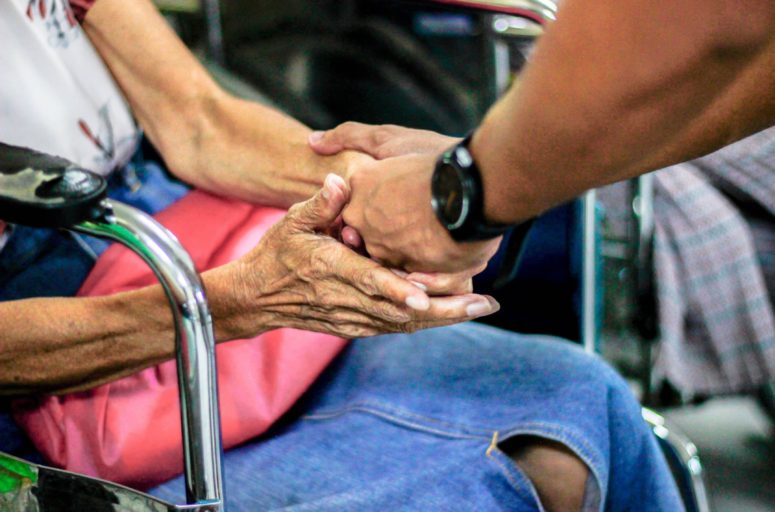Over the past several years, I have had the opportunity to be in the front row as people near and dear to me have gone through some pretty difficult situations. From health emergencies to deaths of loved one, these are the circumstances that both test friendships and build them. Over time, I have learned a few things about how to be a help in these types of crises. A while ago someone asked me to share what I have learned. This is my attempt to do so.
I will be candid; this is one of those posts that is a bit awkward to write. There is a good chance that I will overlook something or that someone reading this will think “that would definitely NOT be helpful to me.” So let me get the disclaimers established right off the bat. What I have provided below are just suggestions. While none of them conflict with Scripture, most of them are not found within its pages either. Also, this is what has worked for me; I’m sure there are better and more creative ways to help someone in need. The main reason that I am attempting this post is because someone asked. And perhaps what I share below will help someone else more effectively serve those in their circle of influence when they are faced with a catastrophic and unexpected life circumstance.
So without further ado, if you want to help someone in crisis, here are my tips on what to do and what to keep in mind:
Make sure you….
- Reach out – I realize that it may seem silly to write this, but if you want to help, the first thing that you need to do is make your willingness to serve known. It would probably shock each of us to learn how many brothers and sisters in Christ who have gone through horrific situations felt isolated and like they had to handle the situation themselves, simply because no one specifically and intentionally told them they were willing to help. Don’t assume that people will “holler if they need help.” Reach out and let them know you want to help.
- Serve as they need you to (not how you want to) – However, when you reach out, make sure you are willing to do what is needed, For example, when there is a death in someone’s family, a lot of people want to bring meals by – not only because it helps meet a practical need (people who are grieving still need to eat!) but because it gives them an opportunity to express their condolences and grieve alongside the loved ones. However, sometimes there’s an abundance of food that shows up at the house of the bereaved, and more food is the last thing they need. When my dear friend passed away unexpectedly, my mom did laundry for his family – because that’s what they needed to have done. Another friend arranged a grooming appointment for my friend’s dog because a stinky animal doesn’t make grieving any easier. I’m very confident that in both situations they would have loved to be in the house delivering a meal to the family – but in the moment they were willing to set aside what they wanted in order to help in the way that was most needed.
- Make specific offers – I realized that this may seem contradictory to what I wrote above, but when someone is in crisis, it is not uncommon for others to say to them some version of “let me know what I can do to help.” The problem is that creates a new burden for the individual who is already facing a difficult situation. Instead of saying ” what can I do to help?” carefully consider the circumstance and make a few offers of what you think may be helpful, while at the same time letting the person know you are willing to do whatever is needed. If you can, give them a few specific options of ways you think they may need help. The closer you are to the person, the better you will be able to anticipate their needs, but even just thinking through their life stage and what is likely on their plate, can be beneficial. For example, a friend of mine who is a mom of four was unexpectedly hospitalized last year. When I reached out to her husband to help, I would text something like, “I’m going to Costco; what do you all need from there?” Other times, I may make offers like, “Would it help if I had your kids over for a play date, run errands, or bring dinner? I can do some combination of all three of these things, or if there is something that would help more, please let me know.” Giving options will often prompt the person in crisis remember what they need help with and even if they don’t take you up on one of your specific offers, you have shown intentionality and thoughtfulness by giving them ideas to consider.
- Pray – Even when you don’t know a way to practically provide help, you can – and should – pray. Pray before you make an offer to help, pray while you are providing the help, and pray after you have done so. You may not be able to provide comfort and solace to the person in need, but God can. And the more you pray for that person, the more you will see them and the circumstance from a godly perspective. This will enable you to serve them better – regardless of the specifics of what type of help you provide. Bring the person, their hurt, and their concerns before the throne of our good and loving King. Ask Him to provide what you cannot, and to lead you to provide what you can.
Remember to…..
- Watch your words – If I could prioritize my list of suggestions, this would be number 2, right after “pray.”. Please, please, think carefully about the things that you are going to say to the person who is hurting. One thing to remember – comparisons are rarely helpful. If you know someone who had the same diagnosis, the time to share about their heartbreaking road of treatment is not when your friend has just received news from their doctor. Additionally, asking someone to talk about their pain when it is raw and new, is generally unwise. Just because you have experienced grief in the past, you do not need to share your sad story with the person who is grieving now. I know this may sound harsh, and please believe me, that is not my intention. But if you want to help, the last thing you want to do is add hurt, and many, many people have had their pain intensified by people who responded to their agony with careless words. If you don’t know what to say, it is hard to go wrong with “I’m so sorry for your pain. I’m praying for you.” And then make sure you do in fact petition the God of comfort on their behalf.
- Not worry about yourself – I know it may sound strange, but sometimes during a crisis, people can get concerned that other people are getting to help more, or that somehow their service is not being acknowledged or appreciated. With as much gentleness as I can, I want to remind all of us that when another person is grieving and hurting, our focus should be on them, not on ourselves. Let’s approach helping others with humility. People in a crisis are dealing with enough already; they don’t need to deal with bruised egos too.
- Think strategically by putting yourself in their shoes – For all of the above, especially when it comes to what we say and the specific offers of help we make, we will be a bigger blessing the more that we put ourselves in the position of the one who is facing the crisis, and we think strategically about how we can benefit them. For example, a friend’s husband was hospitalized, and I knew that most of her practical needs were being met by extended family. However, as I set about baking some muffins for my family, I put on a Spotify playlist of worship songs and prayed for her and her situation. When a song would come on that I thought would be an encouragement to her, I would text her the link to it. She was under no obligation to listen to it right away, but I knew there would be moments of waiting for test results or driving back and forth to the hospital and home, that she would need to refocus her thoughts and emotions on our good God, and music is a great way to do that. Even when neither of us could think of something practical that I could do that day to help bear some of her burdens, this was a way that I could still minister to her. The specific ways you help will differ based on the circumstances and your relationship with the person in pain, but the more you prayerfully put yourself in their shoes, the more likely you will minister in a way that is meaningful and helpful to them.
Upon reading this list, it may seem like some of these things are kind of obvious, and that’s o.k. I never thought that the suggestions above were radical or unique. But I hope that it will help us to better show God’s love to those who are in crisis. And I hope it will help us bring His grace to those who are in pain.

